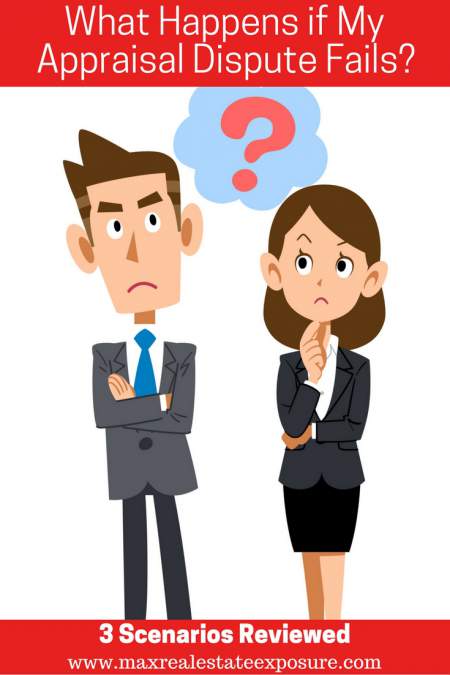Disputing Low Appraisal Values
 Are you wondering how to appeal an appraisal? An appraisal appeal is not all that uncommon in real estate.
Are you wondering how to appeal an appraisal? An appraisal appeal is not all that uncommon in real estate.
Real Estate appraisers don’t always see eye to eye on what a buyer and seller feel a property is worth.
Unfortunately, the appraisal is one of the most important factors dictating what you can sell your home for.
Banks will generally only lend buyers enough money to buy a home near or above the appraised value, so there is usually not much wiggle room for you to set your price higher.
You are stuck pricing your home in line with the appraisal value – a sobering fact if you discover that the appraiser valued your home significantly less than you anticipated.
Fortunately, all hope is not lost. There are ways to challenge a low real estate appraisal.
You can possibly get a better appraisal value than you did initially if you are willing to take the necessary steps.
If you are reading this, you probably put your home on the market, had an offer accepted, and found out from your real estate agent that your home did not appraise for the agreed-upon sale price.
Given what I know about real estate transactions, several folks probably feel frustrated, including buyers, sellers, real estate agents, and mortgage brokers.
Undoubtedly, everyone is ready to burn the real estate appraiser at the stake.
The buyer is also probably second-guessing whether they paid too much for your home. These are frustrating and stressful times for sure. Nobody wants to see a low real estate appraisal come in on a property.
What is a Low Appraisal?
A low appraisal is when a licensed real estate appraiser hired by the buyer’s mortgage lender provides a value less than the purchase price.
When the buyer does not have a significant down payment (more than 20 percent), mortgage lenders will have a problem providing financing to a borrower.
In these circumstances, the appraisal will need to be appealed if the borrower does not have additional down payment funds. Sometimes there is justification for an appraisal appeal; other times, there is not.
Regardless, dealing with an appraisal gap is a pain in the neck.
The following information will give you some ideas on what you can do to get an improved appraisal value and the higher sale price that goes along with it.
Disputing a low real estate appraisal is not fun, but it’s necessary if you want to complete the transaction at the agreed-upon price.
It would help if you first understood how the appraiser figures out the value of a home before challenging their appraisal.
How Does an Appraiser Determine The Market Value of a Home?
Here is a quick summary of how an appraiser determines home values:
In figuring appraised value, appraisers use what’s known as bracketing when making adjustments to a home’s worth.
Keep reading to see all the best tips for disputing a low real estate appraisal.
How to Appeal The Appraisal When It’s Low
 Once a seller finds out they need to fight a low appraisal, it’s essential to know exactly how to rectify the situation. These steps are necessary to challenge a low appraisal of your home.
Once a seller finds out they need to fight a low appraisal, it’s essential to know exactly how to rectify the situation. These steps are necessary to challenge a low appraisal of your home.
Getting a real estate appraisal increased is not easy to do.
Many real estate appraisers are reluctant to change the value of a home unless they have made some obvious errors in their reports.
You need to take these steps to dispute a low appraisal valuation.
1. Get A Copy of The Appraisal.
You can’t figure out what went wrong if you don’t have the full appraisal. Get a copy and go over it with your real estate agent. You will request the appraisal report from the buyer or their agent.
When a home does not appraise, the buyer is given a copy of the appraisal by their lender.
You will not be able to appeal a low appraisal without the report.
2. Look For Mistakes in The Appraisal Report.
When appealing appraisals, you need to realize appraisers can make mistakes. They are not superheroes.
The appraiser is only human, so there is a possibility they made one or more mistakes on the appraisal. They are placing your home in the wrong neighborhood, calculating less square footage, listing fewer bedrooms or bathrooms, etc.
These errors can all negatively impact the value of your home.
3. Look For Comparisons That You Disagree With.
Blatant errors are uncommon, so you may not find anything wrong. But there is a good chance you will find some issues with the homes with which the appraiser compared yours.
Real estate values are relative, so the appraiser has to compare your home to similar properties to decide the current market value.
If the appraisal priced your home noticeably less than you and your Realtor believe it should be, the most likely problem will be the comps the appraiser used.
There are several categories where comparisons can be inaccurate, including:
The most accurate comparison will use homes as close to yours as possible. If you see comparisons that are a stretch, or you can find more precise comparison homes, then you may be able to contest the appraisal.
Having been in the real estate business for thirty-seven years, I have seen all competency levels of real estate appraisers. Like real estate agents, some are exceptional, and others are not.
One of the more common areas where real estate appraisers make mistakes is assigning a value to a particular neighborhood. If the appraiser is not from the area, they might not know the difference between the appeal of one community vs. another.
In real estate, it is prevalent for buyers to place a higher value on one neighborhood than others in the same city or town.
4. Make Sure There Are No Permit Issues.
 If the appraiser failed to include part of your home, like an addition or remodel, there might be problems with the permits.
If the appraiser failed to include part of your home, like an addition or remodel, there might be problems with the permits.
The appraiser may have been unable to locate permits for the work done to your house, which means that the improvements can’t be included in the appraisal.
You may have missed thousands of dollars in value, all because a permit was not pulled.
This is one reason I constantly emphasize the importance of getting building permits to my clients.
You should be able to find permits in your county or city government office. If you can’t find them, do your best detective work to figure out where they are. Otherwise, you can’t take advantage of your improvements.
5. Create Your Own (Unofficial) Appraisal.
Work with your Realtor to find comparable homes that shine a better light on the value of your home.
You can also list every feature that adds value to your home, including any upgrades you have made, such as granite countertops, new cabinets, kitchen and bathroom renovations, a finished basement, spectacular views, hardwood floors, etc.
Anything you can think of that your real estate agent agrees with should be included. You want a document demonstrating the initial appraisal’s error and showing your home’s actual value.
Look at the comparable properties the appraiser used and see if these homes have the same upgrades and improvements.
One of the best ways to market a home is by listing your improvements. Take the time to do this if the sale does not go through, and you have to put your home back on the market.
Make sure you review the factors that affect home value with your real estate agent.
6. Desktop Appraisals Increase The Odds of Mistakes
Over the last few years, several mortgage lenders have allowed desktop appraisals with the pandemic in place. With a desktop appraisal, an appraiser does not visit the home. Without an in-home visit, there is an increased chance of valuation mistakes.
Seeing a property in person makes a significant difference. I can’t imagine ever trying to put an accurate value on a home I didn’t visit in person.
If a desktop appraisal was conducted, you likely have greater odds of winning an appraisal appeal.
7. Petition The Appraiser For Another Appraisal.
With your argument in hand, you can try to see if the appraiser will take another stab at appraising your home. In most cases, you will ask for reconsideration through the bank or lender that hired the appraiser.
Ryan Lundquist, an appraiser in Sacramento, California, has a great template letter you can use when disputing an appraisal.
Look at the link to see how to write a professional letter going through each comp and challenging potential adjustments made for each comparable sale.
8. Take a Hard Look at The Appraiser.
If the appraiser is stubborn and refuses to re-appraise your home, you will need to push harder. The first thing you can do is question the skills and abilities of the appraiser. Not everyone is good at their job. Just don’t be rude.
Keep your emotions in check and treat everyone with respect.
As crazy as this sounds, ensure you did not get a drive-by appraisal where the appraiser did not enter your home. This will dramatically increase the chances that the appraisal is not an accurate measure of your home’s worth.
It is also more common than you might think. It is also a possibility the appraiser may be new to the area, new to the job, or have some other issues that prevented an accurate appraisal.
Likely Problems That Will Make an Appraisal Appeal Successful
Common ways appraisers make mistakes with an appraisal include:
9. Request Another Appraisal as Part of Your Appeal.
Suppose you have a strong argument that the initial appraisal was inaccurate, including a thorough examination of the value of your home that contradicts the appraisal. In that case, you may be able to request another appraisal.
You may be able to get the original appraiser to try again, or you may need to demand a second appraiser. Again, your requests must be aimed at the bank or lender that hired the appraiser.
10. You Can Hire Another Appraiser Yourself.
If you are not getting anywhere with your requests for another appraisal, your only option is to hire an appraiser. Doing so will cost money, which you will need to pay, but it may be worth it if you genuinely believe that you will get better results.
Of course, you may get the same results. But if you know your home is worth more, it is probably worthwhile to fork over the cash to get a better selling price.
Keep in mind, however, that this will not rectify the situation that you are in because the buyer’s lender is probably not going to accept your appraisal.
Most lenders have a group of appraisers that can be used to ensure the bank should be lending money to a particular party. These appraisers are on their “trusted” list. You might do this just for your peace of mind while procuring the next buyer.
What Happens if Your Appraisal Dispute Fails?
 So what happens if you challenge the lender’s appraisal and the appraiser won’t budge?
So what happens if you challenge the lender’s appraisal and the appraiser won’t budge?
Four options can take place when an appraisal comes in low, and the bank will not lend the borrower the money based on the low appraisal.
As a seller, dropping your price to meet the lender’s appraisal is not your first choice.
In the future, however, you need to figure out if you have been fortunate to find a buyer who was overpaying for your home. In other words, was the appraiser correct in assessing your home’s value?
How likely will the same scenario come up again with the next buyer?
You should make sure you huddle up with your real estate agent and get a complete handle on what is going on in your local real estate market.
The Real Estate Market Can Influence Your Appraisal Appeal Moving Forward
Are you in a seller’s or a buyer’s market?
Are home values heading up or down? The answers to these questions should help shape your decision-making process moving forward.
A few years ago, I sold a home in Holliston, Massachusetts, for thirty thousand over the asking price in my local market. We were in the middle of a highly competitive seller’s market where numerous homes received multiple offers.
Many properties were getting bid up way over asking. The problem, however, was the appraisal data had not caught up to the increasing market values.
When the appraisal was done, the appraiser came in at a value of only twenty thousand over the asking price. We were ten thousand short. This case worked out for the best as the seller dropped the price by five thousand, and the buyer came up with additional deposit funds. It was a win-win for both parties.
Not every low appraisal has a happy ending like this. Every circumstance is different. You must weigh your options and determine the best way for your financial and life circumstances.
Ways Appraisals Come in Low
One of the more common ways an appraisal comes in low is when a homeowner sells their home for sale by owner, and the buyer is unrepresented by a real estate agent. Talk about the blind leading the blind.
The owner sets a price too high, and a buyer with no agent foolishly pays it because they don’t know local real estate values.
Other foolish methods of incorrectly pricing a home include:
These methods for valuing a home will only lead to a very inaccurate conclusion.
Final Thoughts on Appraisal Appeals
Winning an appraisal dispute is not easy. Your real estate agent must be skilled in the appraisal appeal process. Fortunately, I’ve been involved in only three disputes in my thirty-seven-year career.
I’m happy to report that my success rate is 100 percent with appraisal appeals.
Other Helpful Appraisal and Home Value Resources
Use these additional resources to understand better home values and how to deal with a low real estate appraisal.
About the author: The above Real Estate information on how to appeal an appraisal was provided by Bill Gassett, a Nationally recognized leader in his field. Bill can be reached via email at billgassett@remaxexec.com or by phone at 508-625-0191. Bill has helped people move in and out of many Metrowest towns for the last 37+ Years.
Are you thinking of selling your home? I am passionate about real estate and love sharing my marketing expertise!
I service Real Estate sales in the following Metrowest MA towns: Ashland, Bellingham, Douglas, Framingham, Franklin, Grafton, Holliston, Hopkinton, Hopedale, Medway, Mendon, Milford, Millbury, Millville, Northborough, Northbridge, Shrewsbury, Southborough, Sutton, Wayland, Westborough, Whitinsville, Worcester, Upton and Uxbridge MA.
This content was originally published here.









